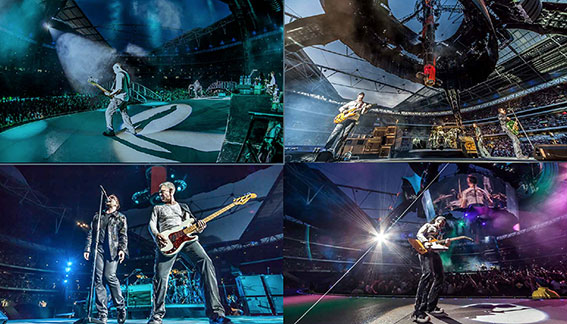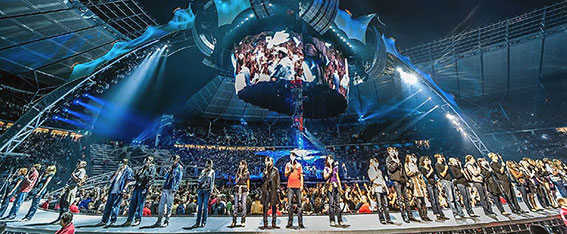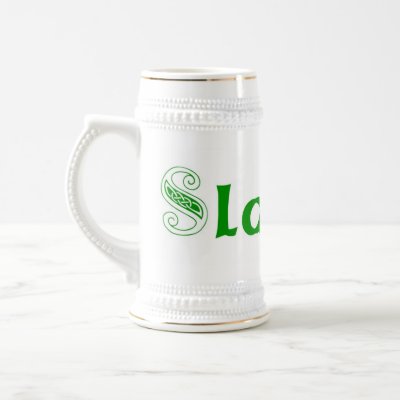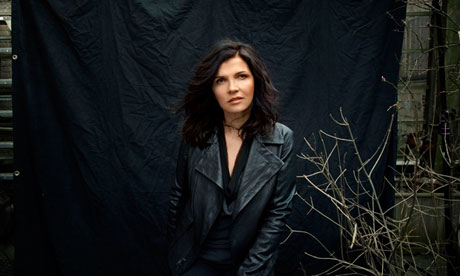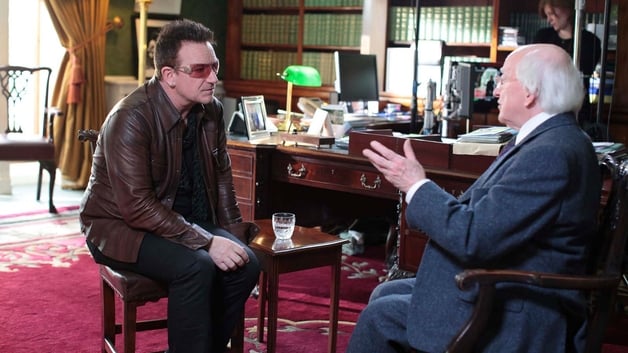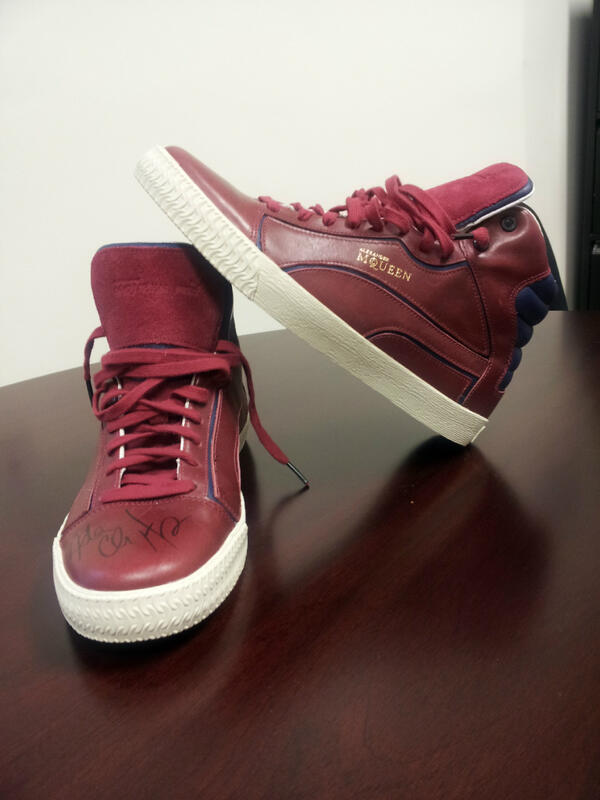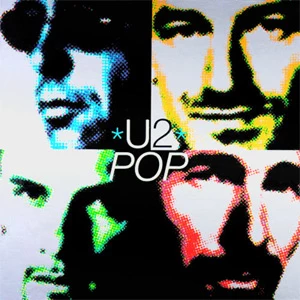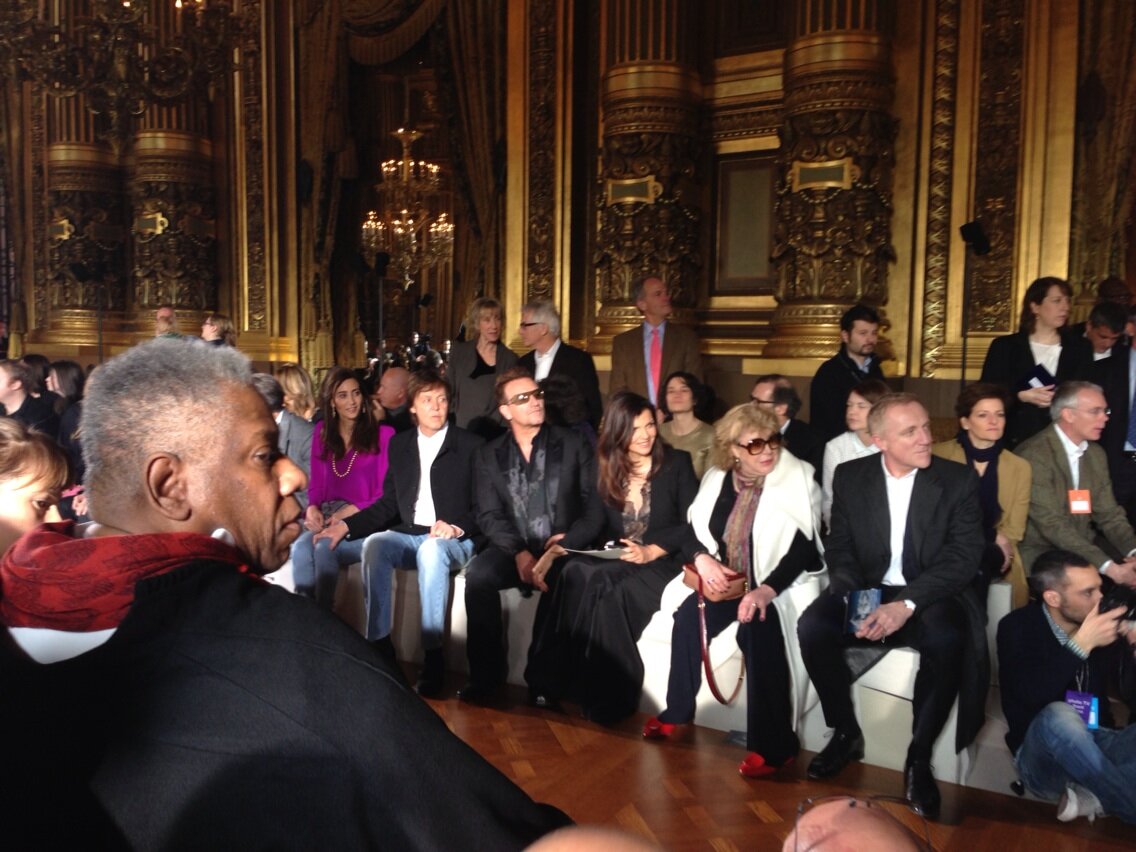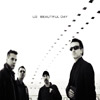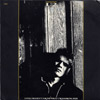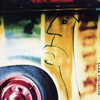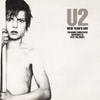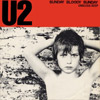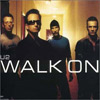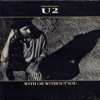In a rare interview, U2’s Adam Clayton discuses why battling his own demons has inspired him to help young people with mental health issues – and talks about the upcoming U2 album...
Heads don’t so much turn as spin Exorcist-style 360º as Adam Clayton walks into the Four Seasons Hotel. The Ballsbridge five-star is used to superstar guests – Metallica, Bon Jovi, Slash, Justin Timberlake and Cameron Diaz among them – but in terms of being recognised and revered in their hometown, U2 are in a different stratosphere to anyone else. Something that, as we’ll discuss later, brings with it its own set of pressures.
The last time we spotted Mr. C at Christmas, he had a near Afro, but today the hair is almost back to regulation U2 bassist length.
We’re here to discuss Adam’s patronage of Walk In My Shoes, April 12’s mental health day of action, but before getting dopwn to business, he’s willing to talk about the day job.
“We very much want to have a record out by the end of this year,” he informs me. “September, October, November; that kind of time. We’re working with Dangermouse who’s a smart guy. He’s on it; he’s excited. It’s a great team and feels very liberating at the moment – anything goes.
“We have an abundance of riches,” Adam continues. “We could make three or four different records and justify that to ourselves, but to make the best record you can, you have to steer away from the ones you can make easily. We’re really trying to get into territory that we’re not comfortable in. If that makes sense…”
It does. During their five-decade career, U2 have never made the same album twice and in Achtung Baby, Zooropa and Pop they have thrown some serious curveballs. I found it highly telling a few years ago when I asked Bono who the competition was, and instead of fellow Hall of Fame-ers like The Who and the Stones he said, “Arcade Fire, The Killers, Franz Ferdinand, Arctic Monkeys.”
“Well, that’s the music we’re excited by,” Clayton avers. “You can still listen to Van Morrison, you can still listen to the Stones or whatever – but it’s different. I like to hear things being expressed in a new way. It’s like, if I was in a band coming up now I don’t think I’d be listening much to U2. You need something to kick against.”
So what’s been floating his musical boat of late?
“The Tribes album, Baby, is one I keep coming back to. I can’t wait to hear the latest Nick Cave record – there’s something a bit different and fresh about the single. The Vaccines have that garage-y Ramones thing going on, which I’m a sucker for. The Villagers album is great – Conor J. O’Brien is an incredibly talented guy. I made a bit of a connection today at the Walk In My Shoes launch with The Original Rudeboys – they have a lot of energy. A band I really like and got to see in London recently are The Maccabees. They sound quite tough on record, but live are a bit… not wimpy, sensitive!”
So that’s five new artists, plus old Nick, who’ll be hoping for a call when U2 take to the road next.
“Who knows?” he laughs. “Everyone always has their ears open. It’s like when Kings Of Leon were on their way up – I think we’d done Top Of The Pops with them and thought, ‘These guys would be perfect for the Vertigo tour'. Which they were. People think it’s us doing them a favour, but it’s the other way around. Nothing keeps you on your game like having a really hot band on before you!”
Is Adam still a massive reggae fan?
“It was a long time ago, when I used to like the reggae woodbines; my perspective changed a bit when I gave them up,” he smiles. “The songs are still great. If Bob Marley had been white he’d have been bigger than The Beatles. If you dissect how it works, rhythmically and everything, him and the Wailers were very on it. It’s not stoned or doped out or anything.”
Which brings us neatly to our main reason for being here – Adam’s ambassadorial role with Walk In My Shoes, a St. Patrick’s University Hospital, Dublin initiative to raise both funds and awareness of the mental health issues facing young Irish people. How did he get involved?
“It’s a combination of three or four things,” he proffers. “My mother – who passed away last year – worked during the ‘80s on the fundraising committee at St. Patrick’s and introduced me to this great guy there, Dr. John Clooney. He said to mum, ‘If Adam wants to know where to invest his money he should look at art'. He really knew his stuff and guided me as I built up my collection. We also talked about the suicide rate among young Irish males being the highest in Europe – yet depression and schizophrenia and the like are treatable diseases.”
Being a teenager is doubly difficult when there are bugger all jobs out there.
“I’m very aware that we’re going through a recession very similar to the one we came out of in the ’70s,” Adam acknowledges. “For me, the rest of the band and lots of the ‘generation of no hope’, music was our salvation. I liked the idea of in some small way carrying on my mother’s work with St. Patrick’s and, then of course, I have my own history with drugs and alcohol.”
Which started when?
“I began smoking and drinking when I was around 15. Every time I had an uncomfortable feeling or problem, instead of figuring out how to solve it I’d self-medicate. Cigarettes and beer were how I dealt with that low-level depression you get as a teenager, and which can develop into something darker if not dealt with properly.”
Our perception of adolescent suicide being a predominantly male thing changed last year when Ciara Pugsley and the Gallagher sisters, Erin and Shannon, took their own lives after being cyber-bullied. Logging on to the Ask.fm site that they were reportedly all members of, one of the first messages I saw was: “Okay, this little slag its about time she fucking killed herself. Please send her messages and give her abuse to the point where she slits her wrists so deep that she dies please x.”
A perfect example of what might more accurately be described as anti-social media.
“Wow… that’s obviously distressing,” says the visibly taken aback musician. “There’s a lot of unpleasant activity out there and weaker people are being picked on. It’s a whole different level of intrusion into their lives.”
Has Adam talked to his own internet-using young fella about the perils of cyber-bullying?
“I’m no longer with the mother – it was a short relationship – and he lives in Switzerland. I see him as regularly as I can. But it’s an interesting question… Personally, I don’t really use a computer very much – there are so many other things I’d prefer to be doing than being online – so I’m not fully aware of all the possibilities out there. I suppose I really ought to be.
“I experienced a limited amount of bullying as a child,” he adds. “I had glasses and was a little bit chubby. I figured the best way to stay out of trouble was to try and make people laugh. That was sort of my technique – later, it changed to getting thin and rid of the glasses (laughs)!”
Was he hassled at school over the English intonation in his accent?
“Em, a little bit. In some ways that was more imagined than reality. I arrived here as a five-year-old, which was the strangest experience. We’d been living in Kenya, so I was used to outdoor smells and the sunshine and talking in Swahili, which wasn’t on the curriculum at Howth National School! You had to ask permission to go to the bathroom, or to do anything, in Irish. I couldn’t figure it out and there were lots of ‘dún an doras’ and all of that stuff. It was a real mystery for me to be in this cold, dark, wet country. Maybe that was the start of my depression!”
The last person I had a sparkling water with in the Four Seasons reading room was Amy Winehouse, who was adamant then that her drug and alcohol-abusing days were behind her.
“I think every addict convinces themselves – and everyone else – that it’s going to be different next time,” Clayton niods. “In my own case, I was able to drink in a way that was destructive and detrimental to my health – but I was always able to do the gig. Until I couldn’t do the gig.”
He’s referring to November 1993's Sydney Football Stadium headliner which, with Adam drunkenly out of commission, U2 played with a roadie on bass.
“You’re in the lucky position of working in music and getting to entertain people… That was a pretty awful feeling and you promise yourself it’ll never happen again. I was lucky – I realised that if I didn’t do something about it I’d lose everything. I’d run out of excuses.”
Before that meltdown, had his bandmates been aware that his drinking was spiralling out of control or was Adam adept at covering it up?
“Not everybody understands addiction, but they were beginning to go, ‘He’s not handling this very well'. I became a very bitter kind of a person that wasn’t living up to my potential. There comes a point, as you age, when that’s not very gracious.
“I was in a successful band with great people whose lives were functional. They were in long-term relationships and raising families. I’d look at them and me and go, ‘What’s the difference here; what’s wrong with this picture?’ I hated not feeling good enough.”
Does Adam think that with a wife and kids at home – or, indeed, on the road with him – he’d have stayed out of trouble?
“I don’t know. I wasn’t very good at relationships. Well, it’s chicken and egg really, isn’t it?”
When did he go from having a few relaxing pre/post-gig drinks to draining the hotel mini-bar?
“Around Zoo TV. That was just a period of confusion for me. I suppose it had started with the success of The Joshua Tree. Looking back now, it being so successful took me about 10 years to get used to.”
Glen Hansard said exactly the same thing to Hot Press about his Oscar win with Once. You spend a lifetime striving for something only to feel a sense of loss when it happens and irrevocably changes your life.
“Nothing is ever quite the same,” he nods. “Everyone says, ‘Well, isn’t that what you wanted… blahdy, blahdy, blah?’ but there are things that you can no longer do. Some of which were very important to me.”
Such as?
“Sitting on public transport and observing people; going to gigs and not having people talk to you all the time so you can listen to the band. I found it hard being in that situation where everybody else in the room knows more about you than you know about them. The good news being that if you’re lucky enough to stay successful, you do get the hang of it eventually!”
Would Adam have had some kind of dependency problem if he’d been a plumber, or was it a specific reaction to the goldfish bowl U2 suddenly found themselves in?
“I can only speculate, but I have a feeling I had a predisposition. The first time I took a drink or drug or had any experience of excitement, my immediate reaction was, ‘I want to do that again, give me more, double it!’ That probably wouldn’t have changed if I was a plumber.”
Glen required a pep talk from Bruce Springsteen to get over the sudden fame ‘n’ fortune blues. What cured Adam?
“I worked it out on my own. You kind of give yourself a slap around the face, eventually. If you put limitations on yourself, you can remove them as well. Nowadays, if it’s the quickest way of getting somewhere I do catch the Tube in London or the Subway in New York. I enjoy that.”
What about the Luas?
“Not as much! I find Dublin a very easy city to be in – but I’m lucky, I’m just the bass-player!”
Hot Press – as you’ll read in our next issue – will be supporting Luke ‘Ming’ Flanagan during the summer when he presents his private member’s bill to the Dáil calling for the legalisation of cannabis. Where, as a very much ex-smoker, does Adam stand on the issue?
“It’s a difficult argument,” he admits. “I used to be a lot more liberal about it. You don’t want to criminalise people (for using cannabis) but… I’m very respectful of drugs and I’m very respectful of alcohol and feel that we’re not properly educated about either. Let’s get the correct information out there rather than scaremongering.”
Adam has spoken of his continual battle with the “the devil inside". Who’s winning at the moment?
“That dark side was related to my inability to psychologically reason with myself,” he reflects. “I’ve worked hard at acquiring the tools to overcome my insecurities and low self-esteem. Unlike 20-years ago, I go to bed now looking forward to the next day. My hope is that Walk In My Shoes will break any remaining taboo surrounding mental health issues. If people feel they need help, they shouldn’t be ashamed to ask for it.”
Is he a Sopranos fan?
“Yes, massive!”
What I hadn’t realised until talking recently to Joey Pantoliano, AKA Aprile crew member Ralf Cifaretto, is that Amnesty International has made mental health a human rights issue.
“I hadn’t either, but that absolutely makes sense,” Adam concludes. “Everybody should have free and easy access to mental health treatment."
http://www.hotpress.com




